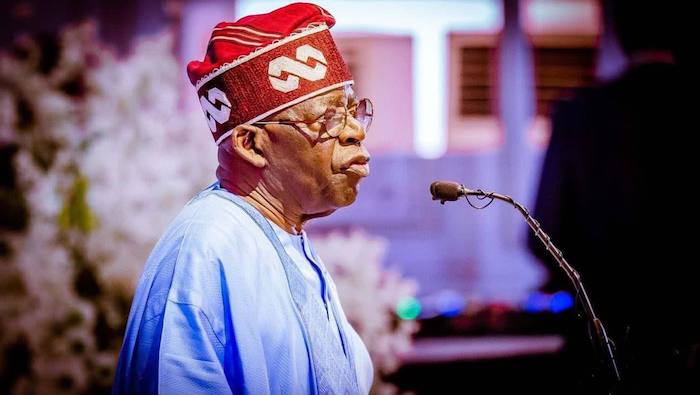Cost of governance: Tinubu limits ministers’ convoys to 3 vehicles
President Bola Ahmed Tinubu has directed ministers, ministers of state, and heads of federal agencies to limit their official convoys to a maximum of three vehicles. The decision aims to curb unnecessary expenses and encourage fiscal responsibility within the government, according to a statement by the Special Adviser on Information and Strategy, Bayo Ononuga, which […]

tinubu
President Bola Ahmed Tinubu has directed ministers, ministers of state, and heads of federal agencies to limit their official convoys to a maximum of three vehicles.
The decision aims to curb unnecessary expenses and encourage fiscal responsibility within the government, according to a statement by the Special Adviser on Information and Strategy, Bayo Ononuga, which was issued yesterday.
The directive follows widespread calls for the government to reduce the cost of governance amidst Nigeria’s economic challenges.
Critics, including labour unions and civil society groups, have pointed out that funds spent on running the government could be better utilised for policies and programmes that would benefit ordinary Nigerians.
- Why Tinubu sacked Mamman, Uju, others
- Shettima pulls out of commonwealth summit as ‘foreign object’ hits his plane in US
Given the economic difficulties being faced by citizens, the president faced a backlash for the large size of the federal government delegation to the COP28 Climate Summit in Dubai in 2023.
In response, Tinubu took steps to reduce the number of officials on foreign and domestic trips.
In August 2023, he barred unauthorised officials from attending United Nations General Assembly meetings and reduced delegations on foreign trips from 50 to 20 officials and 25 for local trips.
He also limited the Vice President’s entourage to five officials for foreign trips and 15 for local ones.
These measures, he said, were part of a broader effort by the federal government to cut down on expenses in line with the nation’s current economic realities.
In the directive issued yesterday, President Tinubu also “ordered all ministers, ministers of state, and heads of agencies to have at most five security personnel attached to them.
“The security team will comprise four police officers and one Department of State Services (DSS) officer. No additional security personnel will be assigned.
“President Tinubu instructed the National Security Adviser to engage with the military, paramilitary and security agencies to determine a suitable reduction in their vehicle and security personnel deployment.
“All affected officials are expected to comply with these new measures immediately, underscoring the urgency and seriousness of these changes,” he said.
W/Bank offers 4-point plan to reduce Nigeria’s governance costs
The World Bank, in its October 2024 Nigeria Development Update report titled “Staying the Course: Progress Amid Pressing Challenges,” suggested four key policies for the Tinubu administration to adopt in order to reduce the cost of governance and provide relief to Nigerians. These recommendations target wasteful government spending and emphasise the importance of social welfare.
The financial institution urged the Nigerian government to cut wasteful expenditures that are not essential, such as the purchase of vehicles and external trainings.
It also advised that the cost of revenue collection for ministries, departments and agencies (MDAs) and government-owned entities should be reduced.
The World Bank, in the report, also urged the federal government to accelerate the rollout of targeted cash transfers and allocate savings from petrol subsidy removal to sustainably expand cash transfers and other well-targeted support.
Tinubu should lead by example – CSOs
Barrister Eze Onyekpere, the Executive Director of the Centre for Social Justice (CSJ), has urged President Tinubu to lead by example when it comes to reducing the cost of governance.
Onyekpere questioned the effectiveness of the president’s directive without clear information on the initial number of vehicles in the convoys of ministers.
He also pointed out that the high cost of fuelling and maintenance makes even a convoy of three vehicles seem excessive under the current economic climate.
He argued that true leadership requires personal sacrifices, and any cost-cutting measures should begin with the president himself.
He said: “Even to think of a cut down being three cars is suggestive of profligacy considering the current fuelling and maintenance cost. Leadership leads and a cut down in the cost of governance should start from the president himself.
“We have not seen or heard of any cut down on the perks of the president, rather, he has increased his perks”, he said.
Abdullahi Abdulkareem, a good governance advocate, urged Nigerians to put an eye on the ministers and use available social platforms and legacy media to raise the red flag if the directive is not respected.
“It is now left for us, the citizens to hold those in power to account. You know it very well that giving directives in Nigeria is very easy, but ensuring compliance is another thing entirely.
“People in neighbourhoods should be vigilant. They should use their android phones and record any minister they see with more than the stipulated number of vehicles and post it online.
“And the decision taken by the president should be cascaded to all the high and mighty, including the president himself, the vice president, governors and their deputies.
“They should also cut down on the way and manner they travel out of the country. They should ban medical tourism so that they can collectively fix the mess in the country.
“Finally, I am looking forward to a time when our leaders would stop sending their children to private schools so that our public schools would get the desired attention. I commend the president for realising that Nigerians are very angry. The decisions he took between Wednesday and today are commendable,” he said.
